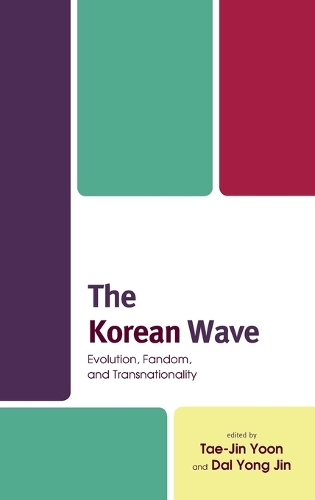
The Korean Wave: Evolution, Fandom, and Transnationality
(Hardback)
Publishing Details
The Korean Wave: Evolution, Fandom, and Transnationality
By (Author) Tae-Jin Yoon
Edited by Kyong Yoon Yong Jin
Contributions by Anthony Y. H. Fung
Contributions by Seok-Kyeong Hong
Contributions by Luling Huang
Contributions by Kyong Yoon Yong Jin
Contributions by Hyeri Jung
Contributions by Bora Kang
Contributions by Ju Oak Kim
Contributions by Eunbyul Lee
Bloomsbury Publishing PLC
Lexington Books
5th October 2017
United States
Classifications
Professional and Scholarly
Non Fiction
Asian history
Regional / International studies
302.23095195
Physical Properties
Hardback
300
Width 158mm, Height 238mm, Spine 28mm
612g
Description
Since the Korean Wave phenomenon started in 1997, Hallyu has undergone many changes. Geographically, while Asia has been the largest cultural market for the Korean cultural industries, other parts of society, including North America, Europe, the Middle East, and Latin America have gradually admitted Korean popular culture. The components of the Korean Wave have also greatly expanded. Hallyu originally implied the exports of a few cultural products, such as television dramas, popular music, and films; however, Korea has recently developed and exported K-pop, digital games and smartphone technologies as well as relevant youth culture. Meanwhile, industrial and technological contexts of the Korean Wave have changed significantly during the last 20 years. The role of social media in the Korean Waves transnationalization in recent years is especially intriguing because fans around the world can easily access social media to enjoy K-pop, digital games, and films. The changes in the nature and appearance of the Korean Wave, conceptual and theoretical shifts in the studies of the Korean Wave, and the influences of the development of media technologies on the Korean Wave are all very significant. This book aims to provide a better understanding of Hallyu's theoretical and institutional history on one hand, and new features of the Korean Wave on the other hand.
Reviews
This book deals with a broad range of subjects, covering a brief history of Hallyu studies, its cultural policies, production and consumption of cultural products, and the evolution of this scholarship. It covers various countries and regions such as China, Japan, Hong Kong, Latin America, Tunisia, and Vietnam, all with different cultural backgrounds. As a result, this book can serve as a good guide for understanding the Korean Wave. * Pacific Affairs *
In this instructive volume, Tae-Jin Yoon and Dal Yong Jin discuss the history of the Korean Wave, better known as Hallyu, and explore its recent trajectories. Combining media and cultural analysis, the novelty of this work lays both in employing a transnational framework to investigate the global appeal of Hallyu and in analyzing a variety of empirically rich cases from different parts of the world. This outstanding book brings great clarity to our understanding of global popular culture and the ways in which politics, society, and contemporary culture intersect and are shaped. -- Nissim Otmazgin, Hebrew University of Jerusalem
Hallyuthe Korean Waveis one of the most significant cultural flows to have emerged from Asia in the last two decades. This excellent edited collection provides ample and compelling material to support such a supposition. Tae-Jin Yoon and Dal Yong Jins book is highly useful for students and researchers interested in cultural globalization and is a major contribution to global media studies. -- Daya Thussu, University of Westminster
The Korean Wave: Evolution, Fandom, and Transnationality is a bold and greatly needed addition to Korean Wave, or Hallyu, scholarship. This rich and theoretically innovative collection significantly updates, deepens, and renders more complex this ever-growing field. Theoretical innovations in the study of cultural imperialism, hybridity, political economy, neoliberal globalization, intercultural media reception, and fandom, as well as emotional economies, put this volume on the cutting edge. Particularly noteworthy are the explorations of Hallyu outside of Korea, the Korean government's explicit policies and plans for Hallyu, as well as attentiveness to contemporary colonialism, fandom, fan clubs, and media industries. This study is a must read for those wanting to refresh their understanding of this expansive cultural phenomenon. -- Kent Alan Ono, University of Utah
Author Bio
Dal Yong Jin is professor in the School of Communication at Simon Fraser University. Tae-Jin Yoon is professor in the Graduate School of Communication and Arts at Yonsei University.
